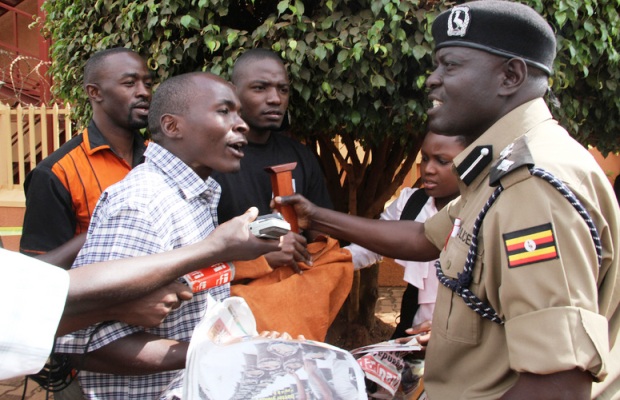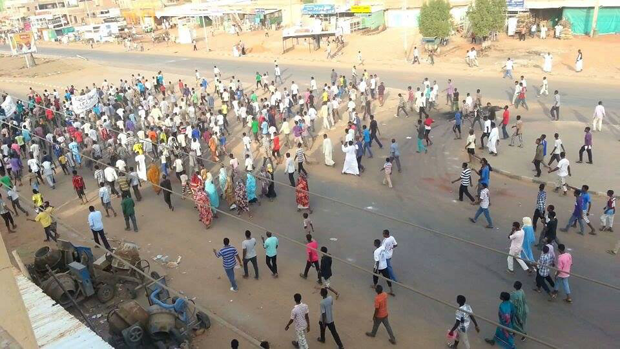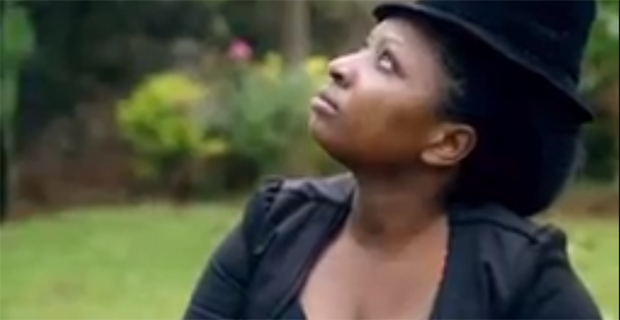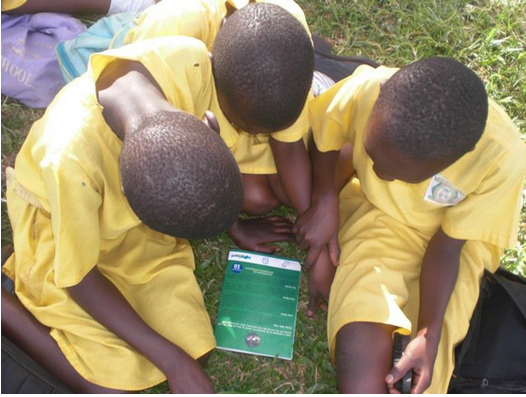22 Oct 2013 | Africa, News and features, Politics and Society

In June 2013, police and protesters clashed at the offices of the Daily Monitor, Kampala. Picture Isaac Kasamani/Demotix
In the age of technology with high-speed Internet access and smart phones, it is sometimes easy to imagine that all journalists’ working lives are the same: deadlines, insufficient resources, worrying about the threats of digital media and the race to break news.
In some ways these concerns are indeed universal. However, what journalists in North America and Europe hardly ever have to worry about is their basic right to report the news. It is true that in a post-Wikileaks and News of the World journalistic environment, all reporters have had to consider their fundamental role in providing news and information and analysis ethically. However, in Africa many journalists find themselves carefully tiptoeing through minefields of media laws which limit their ability to report accurately and truthfully on the news of the day, particularly when reporting on activities of the powerful in government.
Recently in Swaziland, a journalist has been charged with contempt of court for reporting the fundamental issue of whether or not the Chief Justice is fit to hold office, given that he is the subject of impeachment proceedings back in his own country, Lesotho. Several Zambian journalists were brought to court earlier this year, initially accused of sedition. In Ethiopia, journalists are serving time in prison, sentenced for threatening the state with their reports.
Besides individual actions taken against journalists, whole media enterprises are also at risk. In Tanzania, the two newspapers Mwananchi and Mtanzania have been suspended by the unilateral action of the Minister of Information citing breach of the peace concerns – Mwananchi was reporting on new salary structures in the government. Earlier this year, the newsroom of the Ugandan newspaper Daily Monitor was under siege for over a week, while police was trying to find letters that were exchanged between editors and a source.
There is no doubt that much state action against journalists and media houses is unconstitutional. However, there is also no doubt that Africa’s media laws do make provision for draconian action to be taken against journalists and publications.
The Konrad Adenauer Stiftung’s Media Programme has recently published a two-volume Media Law Handbook for Southern Africa, written by Justine Limpitlaw. The handbook is available for free download on the internet. One of the most important aims of the handbook is simply to provide information about what the law is in a number of southern African countries. Statutes are often not available electronically and many journalists simply have no idea about what the laws governing the media are.
A key characteristic of many southern African countries is a media law landscape with a relatively benign liberal constitution at the apex. All constitutions protect freedom of expression to some extent. However, very few changes have been made to media legislation to ensure that the legislation accords with the constitutional right to freedom of expression. Despite oft-expressed anger at the colonial era and its on-going repercussions for the continent, African political elites have essentially retained colonial era media laws as is.
One only has to list many in-force statutes to note that African media law appears to have stultified in the early or mid-20th century. Both Lesotho’s and Swaziland’s Sedition legislation dates back to 1938. Swaziland’s Cinematograph Act is from 1920. Many countries’ Penal Codes date back to the 1960s – prior to their independence from Colonial powers. These Penal Codes criminalise many forms of expression including defamation, insult and false news, and provide for significant jail sentences.
Sadly few attempts have been made to update African media laws. On the rare occasion where a country has engaged in media law reform, the results have been decidedly mixed. South Africa’s attempt to update apartheid-era security laws has been roundly condemned for promoting governmental secrecy at the expense of the public interest.
There is hope. In 2010, the African Commission on Human and People’s Rights adopted Resolution 169 on Repealing Criminal Defamation Laws in Africa. The resolution calls on states parties to repeal criminal defamation and insult laws which impede freedom of speech. In May 2013, the Pan African Parliament adopted the Midrand Declaration on Press Freedom in Africa. The Pan African Parliament resolved to launch a campaign entitled “Press Freedom for Development and Governance: Need for Reform” in all five regions of Africa. These initiatives by intergovernmental African organisations are historic and represent a real opportunity for media law reform. There is also significant pressure being brought to bear on a number of countries to enact access to information laws.
The objective link between a free press and accelerated development is clear. Sadly governments appear all too willing to forego development in their desire to retain political control. Journalists are under real threat in many countries in Africa and the threats are not only from rogue police officers but also from ordinary police officers and other state functionaries merely carrying out the letter of the law.
The Konrad Adenauer Stiftung believes that the media Law handbook could act as a catalyst for bringing together journalists, media owners, members of the judiciary, government officials and media activists to have a serious look at African media law with a view to taking it out of the colonial era. Together with the Pan African Parliament’s and the Comission’s efforts, this is a great opportunity to make Africa a place where journalists can report the news of the day accurately and fairly without fear of arrest and imprisonment.
This article was originally posted on 22 Oct 2013 at indexoncensorship.org
4 Oct 2013 | Africa, Middle East and North Africa, News and features, Sudan

The government of Sudan cut the country off from the internet as protests against the end of fuel subsidies spread.
The release of the annual Freedom on the Net report for the first time includes a chapter on Sudan, authored by Index Award nominees GIRIFNA. This is more than timely, as the country is witnessing a new wave of widespread protests triggered by the Sudanese government’s announcement in late September 2013 that it will lift economic subsidies from fuel and other essential food items.
Based on a survey of 60 countries in Freedom House’s Freedom on the Net 2013, Sudan is categorised as “Not Free” with a score of 63, placing it among the bottom 14 countries in the category. As one of ten sub-Saharan African countries surveyed, Sudan joined Ethiopia as the two “Not Free” countries in the region. Kenya and South Africa were categorised as “Free” and the remaining six – Angola, Malawi, Nigeria, Rwanda, Uganda and Zimbabwe – as “Partly Free”.
Sudan has invested heavily in its telecommunications infrastructure in the last decade, resulting in a steadily increasing internet penetration rate of 21 percent and a mobile penetration rate of 60 percent by the end of 2012, according to the International Telecommunication Union (ITU). It also boasts the cheapest post-paid costs in the Middle East and North Africa in 2012, and healthy market competition amongst four telecommunications providers.
However, these infrastructural and economical advantages are highly reduced against the backdrop of a State that has little respect for freedom of expression, freedom of association, participation and peaceful assembly. The Sudanese regime is amongst the worst globally in terms its obstruction of the access to independent and diverse information both offline and online. A global study on press freedom conducted by Reporters without Borders earlier this year ranks Sudan at 170 out of 179 countries surveyed. This clearly reflects that the violations of freedom of expression impacting the traditional print media are also starting to reflect online.
The Sudan Revolts, the wave of protests triggered by economic austerity plans that hit the country between June and July 2012, was the first time the authorities implemented a large-scale crackdown and detentions of citizens using digital platforms to communicate, connect, coordinate and mobilise. Additionally, the government increased its deployment of a Cyber Jihadist Unit to monitor and hack into Facebook and email accounts of activists. The National Telecommunications Corporation (a government agency) also engages in the censoring and blocking of opposition online news forums and outlets. YouTube, for example, was blocked for two months in late 2012 in response to the “Innocence of Muslims” video.
The attacks on cyber dissidents during Sudan Revolts included the detention of digital activists, such as Usamah Mohammed, for up to two months, the forced exile of Sudan’s most prominent video blogger Nagla’a Sid Ahmad, and the kidnapping and torture of the Darfurian online journalist Somia Hundosa. Moreover, one of the most high profile political detainees from the Nuba Mountains, Jalila Khamis, spent nine months in detention without charges. When she was finally brought to trial in December 2012, the main evidence against her was a YouTube video taken by Sid Ahmad, in which Khamis testified about the shelling of civilians in the Nuba Mountains by the government.
Since September 23 this year, authorities have responded to the new wave of protests with unprecedented violence toward peacefully protesting urban dwellers. More than 200 have been killed in Khartoum and Wad Madani by live bullets fired by riot police, national security agents, and/or state sponsored militias. According to a government statement, 600 citizens have been detained, though activists say that number is much higher. On Wednesday, September 25, the government shut down internet access for 24 hours. When the internet returned, it was much slower, with Facebook inaccessible on mobile phones and YouTube blocked or non-functional due to a very slow broadband connection.
The US sanctions imposed on Omer El Bashir’s regime since 1997 also continue to hinder the free access to the internet and the free flow of information as it limits access to a number of new media tools. This includes limited access to anti virus suites, e-document readers, and rich content multimedia applications that most Sudanese citizens cannot download. The inability to download software security updates makes many users in Sudan vulnerable to malware. Smart phone applications cannot be downloaded or purchased from the iTunes and/or Android stores.
Additionally, Sudan has a combination of restrictive laws that work together to impede freedom of expression both off and online, including the 2009 Printed Press Materials Law, and a new Media law that has recently appeared in Parliament, which officials have hinted would for the first include language restricting online content. Additionally, the National Security Act (2010) gives National Intelligence and Security Services the permission to arrest journalists and censor newspapers under the pretext of “national security,”. An IT Crime Law, in effect since 2007 criminalises websites that criticise the government or publishes defamatory materials. All these laws contradict Sudan’s National Interim Constitution, which guarantees the right to freedom of expression, association and assembly.
A version of this article has been published on GIRIFNA’s website. The arabic version of the Freedom on the Net report can be accessed here.
4 Oct 2013 | Africa, News and features, Uganda

A scene from a music video by Ugandan singer Nnabbi Omukazi.
Ugandan artists have for a long time been able to read the public mood in the country and have taken note of it in their plays and songs.
nder the military dictatorship of Idi Amin, a few brave artists expressed themselves through music and drama. Plays that were critical of the Amin regime were written and performed. Several of the authors were killed or forced into exile.
During the early years of President Yoweri Museveni’s National Resistance Movement (NRM) government, musicians, choreographers and playwrights promoted the new government through their works for bringing back stability after the overthrow of Obote and Lutwa regimes. The general public was full of praises for the new regime and artists tapped into that feeling.
However, as the early optimism waned, many artists became more critical. These artists have been censored, paid off or even deported, delivering big blows to artistic freedom of expression in Uganda in the process.
Nnabbi Omukazi composed a song in which she claimed to have had a dream where a dead politician told her that she did not die from cocaine, but that she had been poisoned.
.
It was believed to be about Cerinah Nebanda, a young, vocal and critical member of parliament who died early this year. The government quickly told the public it was from a cocaine overdose, but her family and some members of parliament were not convinced by this explanation. They decided to hire a pathologist to take body samples of the deceased to South Africa to ascertain the cause of death. The pathologist was intercepted by security en-route to the airport and detained, which compounded the family’s suspicion that the MP had been poisoned because of her critical stance on several government positions. For composing that song, Police interrogated Nnabbi, and her song was banned from the airwaves.
Another artist, Matthias Walukagga, composed the song Tuli bakoowu (We are tired) in which he indirectly hints at the president’s overstay in power. In one verse, the artist asks; “When will the old man also declare that he is tired.” This song was banned on airwaves, but people still buy the CD’s and play it.
One of the biggest Ugandan artists, Bobi Wine aka “Ghetto President” wrote a song criticizing the way small traders in Kampala were being mistreated by the city authorities. In his song Tugambire ku Jennifer (Tell Jennifer to stop harassing us) Bobi attacks Jennifer Musisi, the Executive Director of Kampala Capital City Authority, for not caring about the plight of the poor and only protecting the interests of the rich. Responding to Bobi’s song, Musisi first dismissed it as one without consequence. However, when she realised the pressure the song was creating from the poor city dwellers, she invited Bobi to ceasefire talks. He also walked away with a fat contract to promote city activities starting with the Kampala Carnival 2013, taking place on 6 October 2013.
Patronage does not stop with politicians, it extends to almost all spheres of Ugandan society. Several other performing artists have been given fat contracts from State House (the President’s residence) to work for the presidency in different areas. In fact today, one will see a bus full of artists going to State House on invitation from the President to discuss “issues of national importance.”
Richard Kaweesa and Isaac Rucibigango, both smart and intelligent performing artists composed the song “You want another Rap”, which President Museveni used to woo young voters in the 2011 elections. This song went viral on social media and it worked in the president’s favor. The two artists were handsomely paid by the presidency. Again in 2012 when Uganda was marking 50 years of independence, Kaweesa was given another deal from State House to compose the Jubilee song. This earned him a reported 600 million shillings (US Dollars 235,300).
The same trend can be seen with comedians, as several have specialised in imitating big politicians. Segujja Museveni has perfected the art of mimicking President Museveni and has on several occasions been invited to perform for him. At his first performance before the president, he laughed so hard he had to wipe away tears. It was the first time the nation saw the president have such a hearty laugh. Since then, Segujja’s career has been on a meteoric rise.
As for dramatic artists; they are still reluctant to freely express themselves because of the potential consequences. However, they keep on making references to the political, economical and social spheres of Uganda in their plays. One artist that did this was British-born theatre producer David Cecil. He was deported from Uganda in February 2013 after being accused of staging a play promoting homosexuality. This was at a time when the government of Uganda was up in arms against anyone who seemed not to have a problem with homosexuality.
Most artists have decided to play it safe by keeping away from controversial issues, mainly political, that affect society. Sarah Zawedde, a musician says that the biggest threats to artistic freedom in Uganda are from the cultural, religious and political spheres.
20 Sep 2013 | Africa, News and features, Uganda
 The heroine of The Little Maid, Viola, is an eight-year-old Ugandan girl who lives with her destitute grandmother and dreams of going to school. Instead, she is sent to live with her aunt, who promises to pay her school fees if Viola works for her first. Viola becomes a maid, forced to wash clothes, scrub the bathroom, cook and live in servants’ quarters. But every day when her cousins’ tutor arrives, she crawls underneath the dining room table to eavesdrop on the lessons. Eventually Viola learns to read and write and escapes the clutches of her evil aunt, who is found guilty of child abuse and child slavery and ordered to school her niece.
The heroine of The Little Maid, Viola, is an eight-year-old Ugandan girl who lives with her destitute grandmother and dreams of going to school. Instead, she is sent to live with her aunt, who promises to pay her school fees if Viola works for her first. Viola becomes a maid, forced to wash clothes, scrub the bathroom, cook and live in servants’ quarters. But every day when her cousins’ tutor arrives, she crawls underneath the dining room table to eavesdrop on the lessons. Eventually Viola learns to read and write and escapes the clutches of her evil aunt, who is found guilty of child abuse and child slavery and ordered to school her niece.
It could be a true story. In Uganda there are an estimated 2.75 million children engaged in work, although not many of those will have the happy ending. But The Little Maid is a work of fiction, written by Oscar Ranzo, a Ugandan social worker turned author who has penned five children’s books. Now, The Little Maid is being distributed to schools across the country low-cost (5,000 Ugandan shillings or $1.90 each) through his Oasis Book Project. The project aims to improve the reading and writing culture in Uganda and provide school-children with entertaining but educational stories to which they can relate. Ranzo sells most of his books to schools, with the proceeds used to publish more titles. However, he also donates copies to more impoverished areas.
In 1969, Professor Taban Lo Liyong, one of Africa’s best-known poets and fiction writers, declared Uganda a ‘literary desert’. “What we want to do with this project is create an oasis in the desert,” explains Ranzo. “That’s why I called it the Oasis Book Project.”
The small print
Excluding textbooks, there are only about 20 books published in Uganda annually. According to a study last year by Uwezo, an initiative aimed at improving competencies in literacy and numeracy among children aged six to sixteen years in East Africa, more than two out of every three pupils who had finished two years of primary school failed to pass basic tests in English, Swahili or numeracy. For children in the lower school years, Uganda recorded the worst results.
Growing up in the 1970s and 1980s, Ranzo was privileged to have a grandfather who had a library and attended a private school that held an after class reading session. He was a particularly avid fan of Enid Blyton’s Famous Five series.
“But Mum was a nurse and she wanted me to be a doctor. I wanted to pursue literature and she told me ‘no you can’t do that’, so I did sciences,” says Ranzo, stressing that literature, which remains optional in secondary school, is not taken seriously in Uganda.
Furthermore, many local publishers do not see writing fiction as profitable. “They’d rather publish textbooks and get the government to buy them,” Ranzo explains.
His books are available in two central Kampala bookshops for 8,000 shillings ($3). But in the past 15 months fewer than 20 have moved from the shelves, while he has sold over 3,000 to 20 schools in three districts.
Fiction imitating life
Saving Little Viola, his first book in which the female protagonist, Viola, was introduced, was published in 2011 by NGO Lively Minds. The story ends with Viola being saved by her best friend from two men who want to use her for a ritual sacrifice. UNICEF funded its distribution to 36 primary schools across Uganda as part of a child sacrifice awareness programme.
The primary aim of the Oasis Book Project is to encourage reading, although Ranzo admits he would like people to discuss his stories, which have themes close to his heart. Children being forced into work, the theme of The Little Maid, is something he has witnessed himself.
“Many kids are brought from villages to work as maids in homes in towns or cities, and the treatment they are subjected to is terrible in many cases,” says Ranzo.
His next book, The White Herdsman, which will be released in 2014, deals with the impact of oil production on communities, a timely subject for Ugandans with oil production expected to start in 2016. The book tells the story of a village where water in the well has turned black after an oil spill. A witchdoctor blames the disaster on an albino child.
Ranzo’s stories have been welcomed at Hormisdallen Primary, a private school in Kamwokya, Kampala. English teacher Agnes Kasibante, speaking to Think Africa Press, praises the book’s impact. “It’s actually a big problem in Uganda, most children don’t know how to read. At least those books give them morale to continue loving reading,” she says.
Ranzo has also penned Cross Pollination, a collection of fictional stories for adults about the spread of HIV in a community. According to a recent report, Uganda may not meet its target to increase adult literacy by 50% by 2015.
“I’ve worked in a big multinational company where people have jobs but they can’t write. Reading can help develop this,” says Ranzo, who is currently attending the University of Iowa’s 47th annual International Writing Program (IWP) Fall Residency.
Uganda’s literary comeback
Jennifer Makumbi, 46, a Ugandan doctoral student at Lancaster University, is one of a new generation of Ugandan authors. She won the Kwani Manuscript Project, a new literary prize for unpublished fiction by Africans, for her novel The Kintu Saga. She said Taban Lo Liyong’s description of Uganda as a literary desert was “heartbreaking, especially as in the 1960s Uganda seemed to be poised to be a leading literary producer”.
“But perhaps it is exactly this description that is pushing Ugandans to write in the last ten years,” she continues. “Yes, we have not caught up with West Africa yet but… there are quite a few wins.” In recent years, two female Ugandan authors, Monica Arac de Nyeko and Doreen Baingana, won the Caine Prize for African Writing and the Commonwealth Writers’ Prize respectively. Makumbi’s Kwani prize adds her to a list of eminent Ugandan authors.
Makumbi is optimistic about the future of Ugandan literature: “These I believe are indications that Uganda is on its way.”
This article was originally published on 17 Sept 2013 at Think Africa Press and is reposted here by permission.




 The heroine of
The heroine of